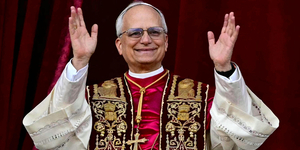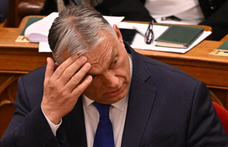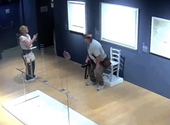Battle on all fronts against the healthcare reforms
An umbrella grouping of 33 civil society organisations calling itself the Hungarian Social Forum-Social Roundtable is planning a fight on many fronts to prevent the new healthcare law from coming into force in January 2009. Legal challenges, referendum campaigns and popular movements all feature on the agenda.
The Hungarian Social forum (MSZF) met last Saturday at the headquarters of the Democratic Union of Healthcare Workers (EDDSZ) after being refused permission to meet at the MAV Hospital and the Kossuth Klub.
Some traces of the previous anti-reform campaign in December remained at the EDDSZ's headquarters on Nador utca. Posters of governing party MPs flapped in the wind, with slogans appealing to the MPs' consciences - though these failed to influence the outcome of the 17 December parliamentary vote. At the end of the meeting, Endre Simo, chair of the roundtable said the group continued to reject a "business-based, multi-insurer" healthcare system and that they agreed with Laszlo Solyom's, the president's, decision to refer the law back to parliament - even though his concerns centred on the lack of real competition in the draft law.
Participants hoped things would be different on 11 February. Agnes Cser, president of the EDDSZ, said an American-style 'personalised' campaign of putting direct pressure on MPs could bring results. She hopes MPs can be persuaded with a letter-writing campaign, and that posters in their constituencies will remind them that their voters want them to reject the law. (In Bekasmegyer, the Socialist MP Laszlo Donath received a small crowd of people demanding that he vote against the healthcare law on 4 February - but he did not make any commitments.) Simo announced the launch of a popular movement. They would, he said, show MPs that "most Hungarians" were against the healthcare law.
Jozsef Sipos, spokesperson for the Socialist Party's social policy forum, told hvg.hu that he supported Katalin Szili, "who thinks several months of legislative work are still needed in this matter."
If real social opposition emerges to the draft law in January, and if it emerges that most of society agrees with the president's concerns, then there is a chance that Socialist MPs will change their minds. He added that amendments could be made to the draft law ahead of the February vote, which could reopen the matter for further debate.
But Istvan Gasko, head of the League of Independent Trade Unions, and Andras Lanyi, head of the Living Chain for Hungary, both members of the MSZF, hope legal challenges will deliver their prize. They are asking the Constitutional Court to consider the law, and they are also asking the public prosecutor to investigate "anomalies and illegalities" in the way the law was drafted. They are also asking MPs to move an alternative draft in parliament, one drawn up by the National Healthcare roundtable, which is supported by Fidesz, and which would retain the "solidarity principle" in healthcare. In practice, this would retain social security as a single state distributor of funds.
They also hope that, even if the law does pass in parliament once again, the autumn referendum will stop it coming into law. The Constitutional Court has allowed the referendum initiative to go forward.
Istvan Gasko, president of the League, supports the referendum imitative. He told hvg.hu it would be clear by the autumn what the "real motivations" behind the chaos in healthcare were - little time remained to establish what level of healthcare people would be entitled to under the new system, he said.
Gasko predicts a "price explosion" if the insurers and care providers are privatised. It will be impossible to deny doctors and healthcare workers the right to charge market prices for their services. If labour costs rise many times over, this will have an effect on the price of the services. The result will be that existing funds will cover far fewer services. The problem can only be dealt with by raising social security contributions, which will be unpopular with the public. The League president hoped that this "monster" of a law would not come into force at the beginning of 2009.
Andras Lanyi, of the Living Chain movement, was not optimistic that Socialist MPs would change their votes in February. "Socialist MPs cannot be influenced," he said, "because they have been paid off and bribed. If people support the referendum in the autumn, then civil society still has a chance of stopping the law coming into force, Lanyi added.
Lanyi added that insurance companies that were not linked to the Socialists and the Liberals would be unlikely to enter the market under these conditions. If the referendum made the introduction of the law uncertain and there were a real chance of the next government modifying it after the elections, then companies with a real commercial interest would be reluctant to get involved. It would emerge, he said, that the companies who wanted to "join the party" were not motivated by true commercial considerations, but that they were "founded using capital gained via party connections," said the Living Chain president.
János Pelle


















